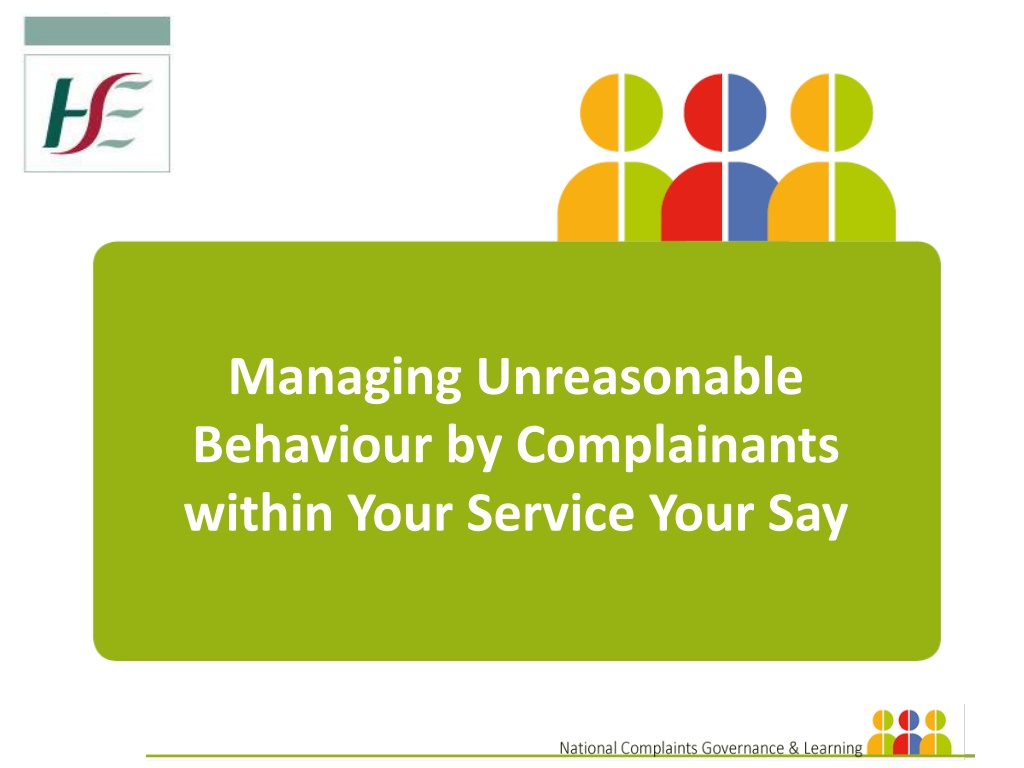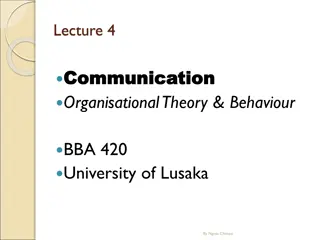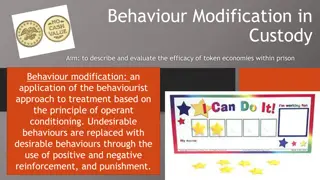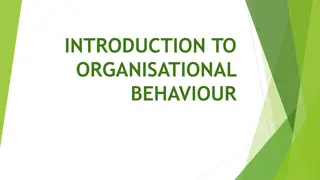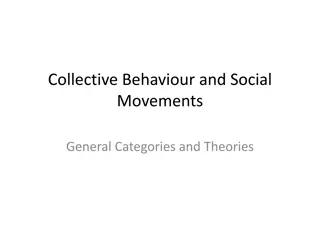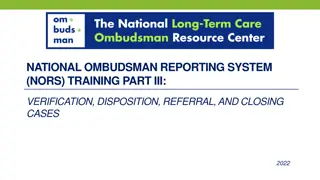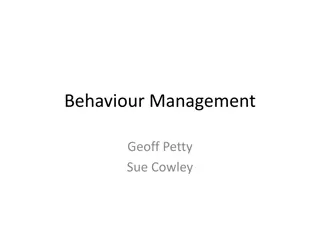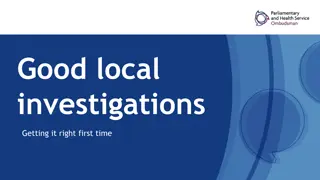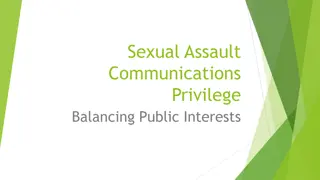Managing Unreasonable Behaviour by Complainants: A Policy Overview
This policy addresses the management of unreasonable behavior by complainants within healthcare services. It outlines the purpose, exemptions, and implementation timeline of the policy, aiming to ensure respect for both service users and staff, provide guidance on managing relationships, and establish clear procedures for responding to such behavior.
Download Presentation

Please find below an Image/Link to download the presentation.
The content on the website is provided AS IS for your information and personal use only. It may not be sold, licensed, or shared on other websites without obtaining consent from the author. Download presentation by click this link. If you encounter any issues during the download, it is possible that the publisher has removed the file from their server.
E N D
Presentation Transcript
Managing Unreasonable Behaviour by Complainants within Your Service Your Say
Managing Unreasonable Behaviour by Complainants within Your Service Your Say Policy Steering Group CHO and Hospital Group Complaints Managers Consumer Affairs National Acute Operations NCGLT Health Service Trade Unions; SIPTU and INMO HSE Human Resources Patient Representatives: Patient Focus / Sage Advocacy
Managing Unreasonable Behaviour by Complainants within Your Service Your Say Policy Programme of Work Commenced in February 2018 Legal Review in April 2019 HSE Consultation from June to August 2019 Consideration of feedback by Steering Group in September 2019 Final documents prepared for Health Service Training Union approval in October 2019 Final approval to be sought from HSE Leadership
Managing Unreasonable Behaviour by Complainants within Your Service Your Say Policy Replaces the 2008 HSE Policy for Dealing with Vexatious Complaints Used only in exceptional cases where all reasonable steps have been taken to support and maintain the relationship Does not supersede policies such as the HSE Management of Work-Related Aggression and Violence in cases of risk to the safety and welfare of staff
Managing Unreasonable Behaviour by Complainants within Your Service Your Say Policy Policy Purpose Ensure that both service users and staff are respected when engaged in the feedback process Provide guidance on supporting and managing complainant relationships within YSYS Provide clear procedure to respond to unreasonable behaviour
Managing Unreasonable Behaviour by Complainants within Your Service Your Say Policy Policy Exemptions Not intended as a policy for managing unreasonable behaviour by service users when generally availing of healthcare services Not intended as a policy for managing unreasonable behaviour by staff
Supporting and maintaining positive relationships Adopt the best practice principles of complaints handling Practice effective Communication Skills Safeguard staff welfare highlight available supports either informally through colleagues or Line Manager or more formally through the Employee Assistance Programme / Occupational Health, etc.
Definition of Unreasonable Behaviour Unreasonable behaviour by complainants, whether experienced or observed, is that which has a disproportionate and unreasonable impact on the organisation (staff, services, time or resources) or which compromises the health, safety and security of staff and other service users or the complainant themselves. It can, in most cases, be broadly grouped into five categories.
Definition of Unreasonable Behaviour 1. Unreasonable Persistence Continued, incessant or unrelenting conduct by a complainant that is having a disproportionate and unreasonable impact on the organisation: staff, services, time and resources. Insisting a complaint is investigated/ reviewed by a different officer, re-framing a complaint, persevering with argument or concerns that have already been addressed
Definition of Unreasonable Behaviour 2. Unreasonable Demands Any demands whether expressed or implied that are made by a complainant that have a disproportionate and unreasonable impact on the organisation: staff, services, time and resources. Demand for an investigation outside the remit of YSYS, repeated demands for reviews, seeking a disproportionate remedy, trying to dictate how an investigation is handled
Definition of Unreasonable Behaviour 3. Unreasonable Lack of Cooperation An unwillingness and or/inability by a complainant to cooperate with the organisation, staff or complaints management process that results in a disproportionate and unreasonable impact on the organisation, staff, services, time and resources. Presenting voluminous, irrelevant or disorganised material, changing complaint in the middle of the investigation, misrepresenting facts
Definition of Unreasonable Behaviour 4. Unreasonable Viewpoint Any views or opinions that are not based in reason and/or logic, that are incomprehensible, false or inflammatory or trivial and that disproportionately and unreasonably impact on the organisation, staff, services, time and resources. Exaggerating issues, presenting unreasonable arguments, focus on small issues, refusal to consider other version of events, desire for retribution, holding a grudge, presenting inaccurate, false or inflammatory information
Definition of Unreasonable Behaviour 5. Unreasonable Conduct Conduct that is unreasonable even given the level of stress, anger or frustration that a complainant may be experiencing as it compromises the health, safety and security of staff and other service users or the complainant themselves. Rude, aggressive, threatening or violent behaviour above what might be expected in situation
Procedure Informal Resolution (as per YSYS policy) Escalation Assessment Phase Escalation Phase One: Formal Warning Notice Escalation Phase Two: Final Notice Right of Appeal HSE Ombudsman /Ombudsman for Children
Procedure Informal Resolution Welcome feedback Attempt to resolve issue at POC Support positive engagement Practice effective communication skills Record any incidents Escalate to Stage Two if unresolved at Stage One
Procedure Escalation by Complaints Officer / Review Officer: Assessment Phase Complete Unreasonable Behaviour Escalation Form including evidence log Attach examples of behaviour referred to if documented evidence available e.g. copies of inappropriate correspondence Refer to and discuss with local Consumer Affairs Consumer Affairs to determine, within 10 working days, onward referral to Accountable Officer or recommend further support of complainant relationship
Procedure Escalation Phase One Formal Warning Notice Accountable Officer to determine, within 10 working days, to issue a Formal Warning Notice or recommend further support of complainant relationship Where Formal Warning Notice is issued, Accountable Officer to advise complainant of option to discuss Notice Behaviour moderates no further action Continuation of unreasonable behaviour escalation to Phase Two
Procedure Escalation Phase Two Final Notice Accountable Officer to determine, within 10 working days, to issue a Final Notice or recommend further support of complainant relationship Where Final Notice is issued, Accountable Officer to: advise complainant of conditions or restrictions imposed advise complainant of right of appeal
Procedure Appeal HSE Submitted in writing, setting out grounds, within 10 working days from date of issue of Final Notice to Chief Officer / Chief Executive Officer / National Director / Director of NAS and determination made within 20 working days Advise complainant of outcome of appeal including right to request a review of the administration of the policy from the Ombudsman /Ombudsman for Children
Procedure Appeal Ombudsman / Ombudsman for Children Submitted as per the Ombudsman s / Ombudsman for Children s procedures following the appeal decision by the HSE
Supports Guidance Manual Letter Template Suite Consumer Affairs
